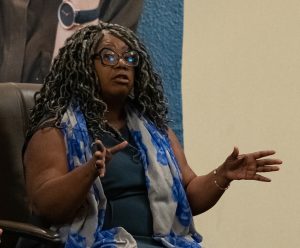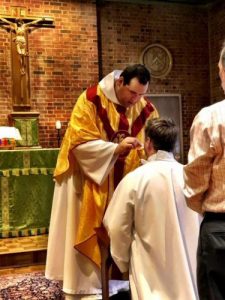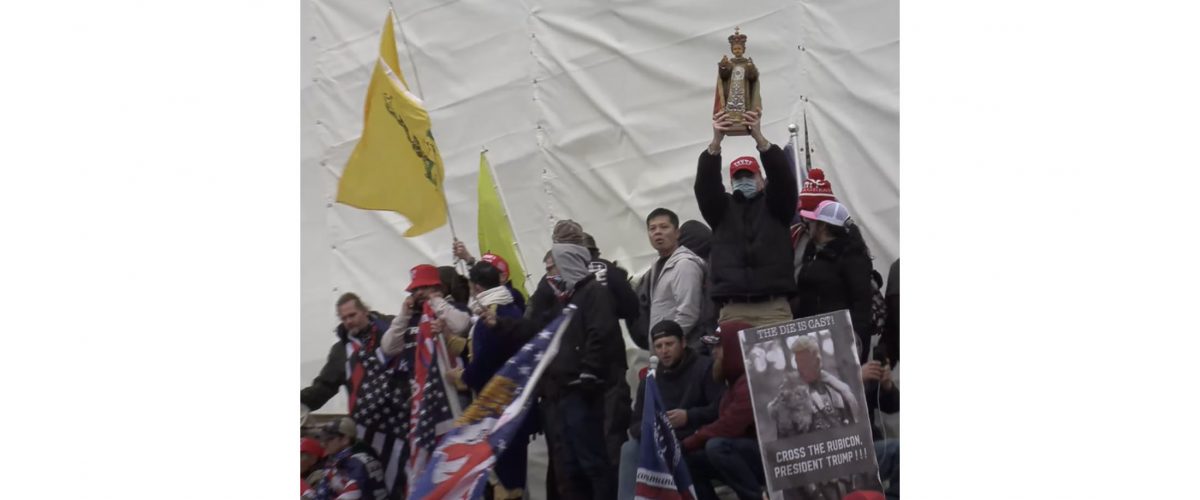While much of the discussion about Christian nationalism focuses on white evangelical Christians, there’s a parallel and equally dangerous movement in Catholicism, Anthea Butler told a group of journalists and scholars Sept. 10.
Butler, professor of American social thought at the University of Pennsylvania, a historian of African American and American religion and author of White Evangelical Racism: The Politics of Morality in America, was a keynote speaker at a symposium on Christian nationalism and democracy at Fordham University. The event was sponsored by Religion News Service to mark its 90th anniversary as an ecumenical news outlet.

Anthea Butler
Modern Christian nationalism connects with an ancient idea within Catholicism called Catholic integralism.
Catholic scholars have defined the movement as this: “Rendering God true worship is essential to (the) common good, and that political authority therefore has the duty of recognizing and promoting the true religion.”
These ideas are carried into today’s political and religious debates by people like vice presidential candidate JD Vance and former Donald Trump adviser Steve Bannon.
Often, this movement blends conservative Catholic beliefs, such as support for the Latin Mass, with ultraconservative political beliefs to create yet another subgroup within the Christian nationalist movement in America.
As part of a panel discussion on white Christian nationalism, Butler — who was raised Catholic — was asked specifically about this iteration of Christian nationalism.
“Let me just say it in one simple phrase,” she replied. “The problem we have with these people is they’re all converts. And I know that’s going to make some people nervous, but let me make you nervous, OK?
“Catholic integralism is really in a way very simple. … All we have to think about is the way that you mix your spirituality with your politics.”
“Catholic integralism is really in a way very simple. I think people get upset when they hear the world ‘integral,’ but all we have to think about is the way that you mix your spirituality with your politics. How do you think about these two things and that they are not separate, but they’re together?”
Catholics and the NAR
Catholic integralists and Protestant adherents to the New Apostolic Reformation share much in common, she said. “The way this comes together is through the spiritual realm. Both of these people think about demons. Both of these groups think about the supernatural. Both of these groups think about what does God’s supernatural hand have to do in history.”
She cited two images that connect the dots but that most people didn’t understand when they saw them.
The first is the Infant of Prague, an easily recognizable statue to worldwide Catholics that has been coopted into American politics, Butler said. The Infant Jesus of Prague dates to 16th-century Spain. And oddly, people at the January 6 insurrection were holding up replicas of that statue.
 Then more recently, Donald Trump posted on social media a photo of Our Lady Guadalupe and said, “Happy birthday, Mary.”
Then more recently, Donald Trump posted on social media a photo of Our Lady Guadalupe and said, “Happy birthday, Mary.”
That brought praise from the group Catholics for Trump, which responded: “Under President Trump’s leadership, our nation witnessed unprecedented support for religious freedom, with significant victories both domestically and globally. President Trump restored protections for faith-based organizations and bolstered the rights of religious institutions against governmental overreach.”
Ironically, Our Lady of Guadalupe is an icon venerated by Catholics in Mexico, a country Trump has said is sending its rapists and criminals and thugs to America.
These two things illustrate the role Catholicism plays in Trump’s political base, Butler said.
Catholicism and authoritarianism
“And if we wanted to go back and dig into history, and this is where it gets dangerous, some of the things in Catholicism if we start to think about what happened in Spain and authoritarianism and everything else, really fit in with these movements. And that is where the danger, and that’s where I think we have to learn a different language about talking about Catholics and politics.”
Catholicism teaches a kind of authority structure that lends itself well to authoritarian political leaders, she said. “We usually listen to local priests, we listen to our bishops, we listen to our cardinals, we listen to the pope.”
That has broken down in Catholicism today, however, because Pope Francis is a Jesuit who “makes a lot of people who are conservatives very nervous,” she said.
“Maybe it’s not just abortion, maybe this is also about the broader issues of sexuality and the broader issues of race.”
This spills over into American politics through conservative bishops and priests “who are really not for Francis and others who are, and that falls into politics about immigration,” Butler said. “It falls into politics about LGBTQ issues. It falls into politics about education and what Catholic education is. And, of course, the big one, abortion. What has always driven journalists to talk about Catholicism has been abortion. But I want to submit to you that maybe it’s not just abortion, maybe this is also about the broader issues of sexuality and the broader issues of race.”
Too often the racial connection to Catholic integralism is overlooked, she asserted.
Talking about this is “really important with Catholicism when we are talking about a whole group of Latino Catholics who are willing to go and vote for Trump because they are hearing this from their priests and that they are used to authoritarianism from the countries that they have immigrated from to come to America.
“You cannot think about integralism just as this idea about a JD Vance intellectual sort of Catholicism. It is also about the people who are sitting in the pews every week in churches like I went to in Los Angeles and other places who are sitting in Spanish masses and hearing about why Trump is going to be good for them because Trump is going to make sure that their families are taken care of and that their daughters get married to somebody who’s not gay.”

Texas Gov. Greg Abbott, with his wife, Cecilia, attends a primary election night event, Tuesday, March 1, 2022, in Corpus Christi, Texas. (AP Photo/Eric Gay)
The immigration question
All this gets more curious when immigration policy comes to play, Butler said, citing the work of Catholics along the U.S.-Mexico border caring for immigrants while a Catholic governor, Greg Abbott of Texas, seeks to undermine the ministry of his own church.
“When you have the demonization of the border and everyone else, and you have bishops in the border that are working in places like San Diego and El Paso that are having to fight with a Catholic governor in Texas who wants to get rid of the Catholic Charities and everybody else who’s doing the work down there on the border — this is where we tend to think about this as not being political but being something else. But I want to submit to you that it’s part of this Catholic integralism, except that Greg Abbott is thinking about it in a very different way.
“He’s thinking about it as though I’m going to be the one who is putting down the law and could tell the bishops what to do, and that’s not true.”
Catholic influencers
Then there are the “Catholic influencers,” she said. “You might think this is not something that’s serious, but it is very serious when you have somebody like a JD Vance who I would consider in a way a Catholic influencer because he didn’t come through (a catechism) class. This burns me up. I cannot even tell you how much this makes me mad. But you get somebody that you talk to and you have a few theological lessons and you get baptized and you get your first Communion and that makes you Catholic.

JD Vance receives first Communion as a convert to Catholicism in 2019. (Photo: Catholic Citizens)
“When you don’t go through the Rite of Christian Initiation and do it just like everybody else on Holy Saturday, you jump the line. And when you jump the line and you decide to do this, you’ve missed half of what Catholic theology is all about. You don’t care about the preferential option for the poor, you don’t care about any theological thing whatsoever. What you care about is a certain kind of Catholicism that looks like fundamentalism, and that’s not what the Catholic church is. You don’t have to wrestle with Dorothy Day, you don’t wrestle with anybody. And so the Catholicism of JD Vance is based on something that is very, very dissimilar. It is pre-Vatican I, it is Pre-Trent, for those of you who know some history here.
“He doesn’t care. He wants us all — well, some of us — wearing mantillas and not even there in the front, and God forbid that somebody like me would get Communion. But this is the problem because now what we have are people like Candace Owens and others representing Catholicism to the broader world where our bishops may be tied up and don’t have a voice to talk about what it means to be a faithful Catholic in an election cycle that is about democracy, in an election cycle where the president of the United States, who’s the second Catholic president of the United States, is branded as somebody who is not Catholic at all. And I think that’s a real problem.
“So when we talk about Catholicism and politics and Christian nationalism, we have to understand that Catholics are just as invested in what nationalism is,” Butler declared. “You don’t get Catholics who fight in the middle of the street in Philadelphia back in the 1800s because they’re not interested in being in America.
“They’re interested in being Americans, but it’s not the same kind of battle anymore. The battle is for what we consider to be a real Catholicism and how this Catholicism with all of its works, with all of its beliefs, whether that’s about sexuality, homosexuality, whether that’s about immigration, whether that’s about abortion and everything else. How do these things align with nationalism?”
Today, these pseudo-Catholic theologies are being driven by Protestant theologies and ideals, she said. “We need to pay attention to how that is morphing out in this election cycle, how that’s affected our current president, and how that’s going to affect Catholicism in America for some time to come.”
Related articles:
What does it mean that JD Vance’s wife is the daughter of immigrants and Hindu?
Butker’s commencement speech echoes MacArthur and other male supremacists | Opinion by Rick Pidcock
JD Vance and Al Mohler use fuzzy math to sound an alarm on falling birth rates | Analysis by Rick Pidcock


